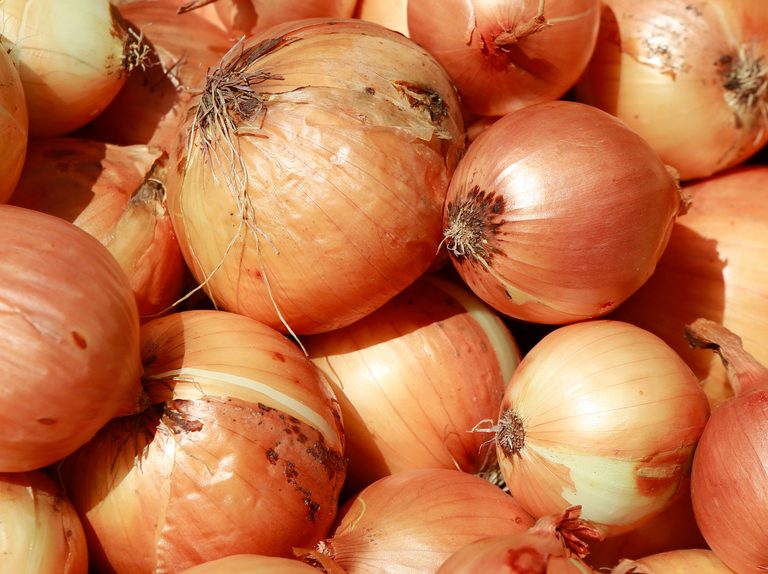Onions boast remarkable versatility in the kitchen. They can be blended into soups for a creamy texture, diced to lend a satisfying crunch to tacos or sandwiches, and infuse delightful flavor into a wide array of dishes. Given their versatility and numerous culinary applications, purchasing onions in bulk is a savvy choice. Buying in bulk not only reduces the frequency of grocery store trips but also offers potential savings at checkout.
Moreover, another compelling reason to consider bulk purchases of onions is their impressive shelf life. When stored correctly, onions can maintain their freshness for weeks, and even months. It’s wise to always have a supply of onions on hand as they serve as indispensable culinary companions throughout the year. This often means investing in those generous mesh bags brimming with a variety of onion types from the supermarket.
However, unlike some other vegetables, onions don’t exhibit obvious signs of spoilage, which can lead to unintentionally keeping them past their prime. For optimal storage, onions should be kept in a cool, dark environment, ideally between 45 and 55 degrees Fahrenheit. Whole, raw onions stored in such conditions can remain fresh for two to three months. Suitable storage spaces may include a cellar, pantry, unheated basement, or garage.
Yet, for many households, finding such cool storage spaces can pose a challenge. In such cases, refrigeration becomes a viable option to maximize onion shelf life. When stored in the refrigerator, onions can last for at least two to three months, albeit with the caveat that their texture may become slightly soft due to their tendency to absorb moisture.
Alternatively, if refrigerator space is limited and room temperature storage is the only choice, whole, raw onions can last two to four weeks when stored at room temperature. Regardless of storage method, it’s essential to ensure proper ventilation to prevent mold formation. Utilizing an open basket, mesh bag, or loosely covered paper bag facilitates adequate airflow, whereas storing onions in plastic bags should be avoided as they impede ventilation.
Additionally, it is crucial to note that onions should be stored away from moisture-releasing foods like potatoes, as this can hasten spoilage. If you’re contemplating whether to keep or discard an heirloom potato and onion bin, ensure that the compartments are sufficiently separated and ventilated to prevent gas interaction. If not, updating your storage solution may be prudent to maintain the freshness of your onions and potatoes.

How to Preserve Peeled or Sliced Onions?
After removing the outer layers of an onion, it’s essential to store it in the refrigerator to prevent contamination. Whether halved, sliced, or diced, raw onions should be refrigerated in an airtight container or sealed plastic bag. This storage method ensures their freshness for seven to 10 days.
Similarly, cooked onions should be placed in an airtight container and refrigerated. Like most leftovers, cooked onions maintain their quality for up to four days in the fridge.
An added benefit of refrigerating onions is that the cold temperature slows down the enzymes responsible for inducing tears.
What’s the Shelf Life of Onions in the Freezer?
The good news is that raw onions can be frozen to prolong their shelf life. Begin by peeling and chopping the onions as desired, then store them in an airtight container, freezer bag, or wrap them tightly in aluminum foil or plastic wrap. Raw onions remain viable for up to eight months in the freezer.
Similarly, cooked onions can be frozen for up to 12 months when stored in an airtight container or freezer bag.
How to Freeze Onions Properly?
For extended storage, freezing is an excellent solution. While freezing whole onions isn’t recommended, chopped or sliced onions can be frozen and used directly from the freezer. Simply place the chopped or sliced onions in a freezer bag, expelling as much air as possible before sealing and freezing.
Keep in mind that freezing alters the texture of onions slightly. Therefore, it’s best to use frozen onions in cooked dishes like soups and stews, rather than in raw preparations such as toppings for chili or hot dogs.
What’s the Typical Lifespan of Onions?
According to the National Onion Association, whole onions typically last between one to three months when stored properly. On the other hand, cut onions have a shorter lifespan, lasting only one to two weeks. In the freezer, chopped onions maintain their quality for about eight months.
How to Determine if Onions Have Spoiled?
There are three indicators of onion spoilage: changes in color, texture, and odor. Spoiled onions may develop dark spots, eventually leading to mold growth. Additionally, onions that have begun to sprout should be discarded as they are deteriorating.
Checking the texture of onions is another way to assess their freshness. Onions with soft or mushy spots are likely starting to spoil.
Lastly, the sniff test can help detect spoiled onions. While raw onions naturally have a distinctive odor, any unpleasant or unusual smell indicates spoilage. If your onions smell off, it’s time to replace them with fresh ones.
